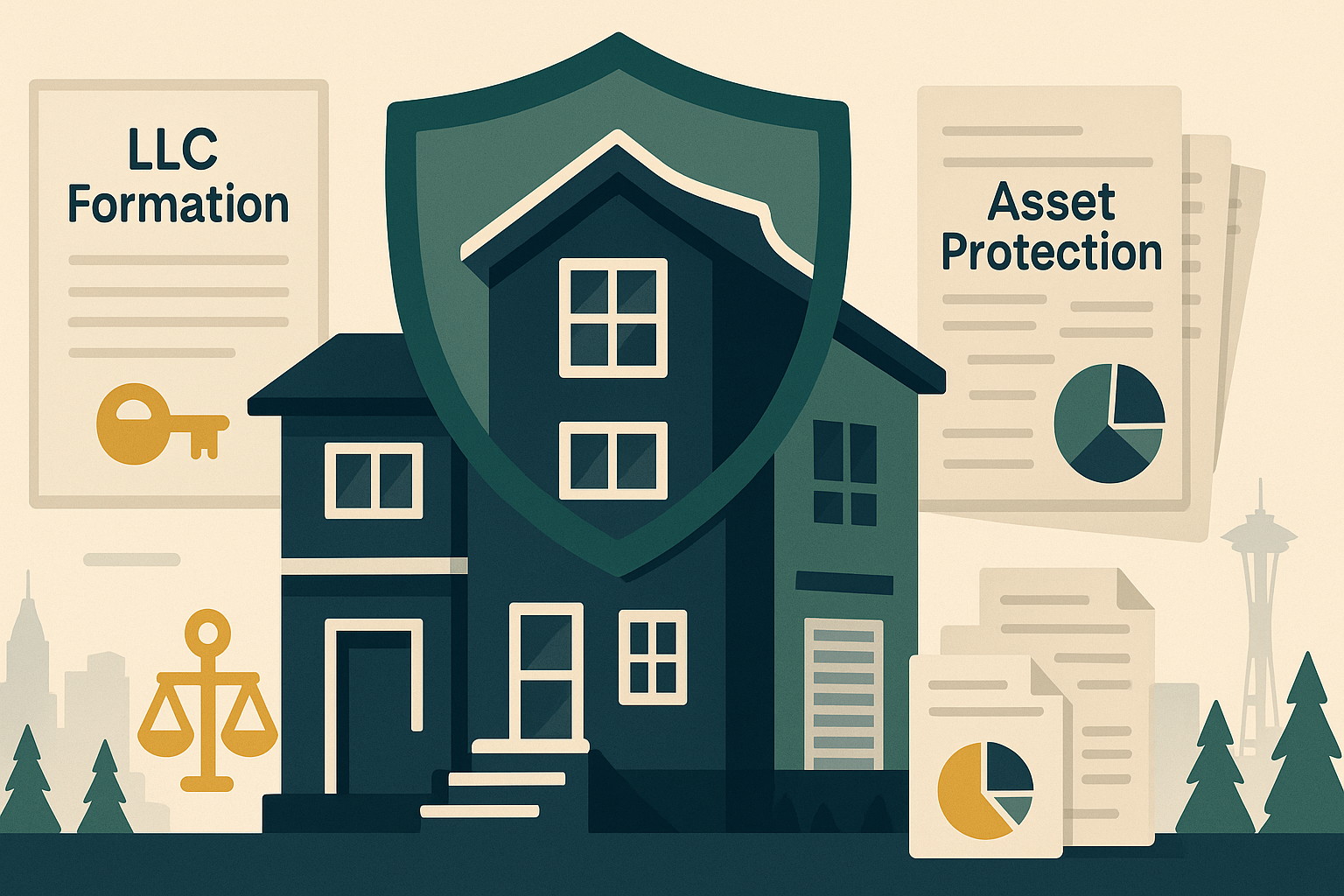Choosing the Right Business Structure for Your Washington State Real Estate Investments

Picture this: You've found the perfect rental property in Seattle. The numbers work. The location's solid. But here's the thing: how you structure your investment could make or break your financial future.
Your business entity isn't just paperwork. It's your shield against lawsuits, your tax strategy, and your scaling blueprint all rolled into one.
What's the Best Entity for Real Estate in Washington?
Limited Liability Companies (LLCs) dominate for good reason. They protect your personal assets while keeping taxes simple. Here's why Washington investors choose them:
- Your home stays protected if a tenant sues. Your personal bank account? Untouchable.
- LLCs offer pass-through taxation with no double taxation headaches. The profits flow straight to your personal return. Clean. Simple.
- Setting up an LLC in Washington costs $200, according to the Washington State Secretary of State. Compare that to potential lawsuit damages. No contest.
When Do REITs Make Sense?
Real Estate Investment Trusts work for specific situations. Got $100,000+ to invest but want zero property management? REITs might fit.
Public REITs trade like stocks. You buy shares, collect dividends, sell when ready. Private REITs offer higher returns but lock up your money longer.
The catch? REITs must distribute 90% of income to shareholders. Great for passive income seekers! Not ideal if you want to reinvest profits.
Partnership Structures: Pooling Your Power
Partnerships shine when you need more capital than you can swing alone.
General partnerships split everything equally (profits, losses, and liability). Each partner can make binding decisions,and if you’re thinking that sounds risky but simple, you might be right.
Limited partnerships protect silent investors. You manage the property, they provide cash. They can't lose more than their investment. You handle the day-to-day decisions.
Washington allows both structures, but limited partnerships require more paperwork and annual filings.
How Do You Choose What's Right?
Your investment goals drive your entity choice. Here's the breakdown:
Single property, first-time investor? LLC wins. Easy setup, solid protection, flexible management.
Multiple properties planned? Still LLC, but consider separate entities per property for maximum asset protection.
Passive investor with substantial capital? REITs or limited partnerships make sense.
Planning to flip houses? LLCs work, but you'll pay self-employment taxes on profits.
Washington's business laws favor LLCs for real estate. No franchise tax, reasonable filing fees, and strong liability protection.
What About Taxes?
Here's where it gets interesting. LLCs let you choose your tax treatment.
Default: Pass-through taxation (like sole proprietorship) Option 1: S-Corp election (potentially save on self-employment taxes) Option 2: C-Corp election (rarely makes sense for real estate)
Most Washington real estate LLCs stick with default taxation. It's simple and effective.
Setting Up Your Structure Right
Don't skip the operating agreement. This document protects you if partnerships go south or family members want out. Proper real estate investment structuring prevents costly disputes down the road.
Include buy-sell provisions. Why? Because death happens. Divorce happens. Your operating agreement should handle both scenarios (and more!) smoothly.
Consider management structure carefully. Who makes purchase decisions? Who handles tenant issues? Who signs contracts? Spell it out now.
Common Mistakes to Avoid
Mixing personal and business funds kills your liability protection. Keep separate bank accounts. Always.
Forgetting annual filings can dissolve your entity. Washington requires annual reports and fees.
Using generic online forms might miss state-specific requirements. Cookie-cutter solutions often create problems later.
Ready to Structure Your Success?
Your entity choice shapes everything (taxes, liability, growth potential, and exit strategies).
Most Washington real estate investors find LLCs hit the sweet spot of protection and simplicity, but your situation might call for different solutions.
The investment that could change your life deserves proper legal structure. Don't let poor planning derail your real estate dreams.
Need professional guidance on structuring your Washington real estate investments? The experienced attorneys at K&S Canon help investors choose the right entity, draft proper documentation, and ensure legal compliance. Contact K&S Canon today to protect your investments with strategic legal planning.
Disclaimer: This blog post provides general information only and does not constitute legal advice. Real estate investment laws vary by situation and jurisdiction. Every investment scenario is unique, and legal requirements may differ based on individual circumstances. Please consult with qualified legal counsel to discuss your specific needs and obtain personalized advice for your real estate investment structure.




